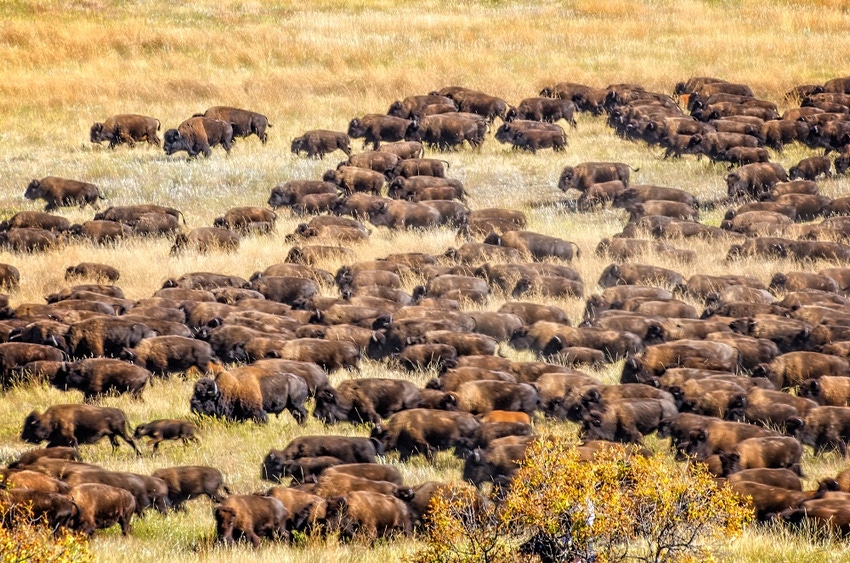
Civilized humanity has seldom shown much appreciation for grasslands or other "wild" environments.
The first Spanish explorers to travel through the country north and west of what is now San Antonio, Texas, reported back that the area could never support settlers; that it was a desert of grass with no wood for buildings or fires.
Similarly, a prime requirement for people to gain title to land under the Homestead Act was that they must "plow the prairie and make it productive."
The very things that made the grasslands so productive of animal life and fertile soil – the wide range of forage vegetation and the diverse multitudes of animals that fed on it – were seen as obstacles rather than resources.
Far too much of this attitude persists in agriculture today; check the magazine advertisements touting herbicides to promote "clean" pastures. Ask 10 ranchers for their biggest problem and nine of them will say weeds or brush. I do not suggest that we don't have weedy, low-producing pastures. We have them in abundance, but weeds are not the problem but rather a symptom of a breakdown in the local ecology.
Prior to human intervention, grasslands formed and maintained themselves for eons through the actions of and the relationships between uncountable multitudes of individual organisms of many different types of life forms. These organisms, from large grazing mammals and the predators that preyed on them to minute bacteria and fungi, all played vital roles in grassland health.
There was one rule for an organism to be included in this pageant of life: by living and dying, the organism must contribute to the long-term wellbeing of the local ecological system.
Man has thrust himself into a position of dominance over the natural order and it has become painfully obvious that our power is greater than our wisdom. If we had to live under the same rules as all other life forms, we probably would get voted out of the club.
We are an impatient species, sometimes so greedy that we sacrifice the goose in order to more quickly gain the golden egg. Too often we take the short term gain that must be paid for with long term cost.
To be fair, many of our mistakes come about not from greed but from a lack of knowledge. We are overwhelmed with information from universities and from industry that is, in many cases, incomplete and far too often, wrong. It was perhaps not wrong given the questions asked: Did it kill the horn flies? Did the weeds die, Was cattle sickness reduced? If the results were positive, then conventional wisdom holds that the practice should be adopted.
The question that should have been asked was, "Did the practice solve the root problem in a way that strengthens all parts of the soil-plant-animal-wealth-people complex that we call a ranch?"
Several years ago, some soil testing labs quit testing for soil organic matter content on the premise that there was no feasible way to increase this parameter under modern agriculture. There are today, in positions of authority, range scientists who recognize no benefit to providing growing season recovery time (rotational grazing) to native ranges. Both these positions, and others that are similar, result from what might be called "mule blinder observation." People affected by this malady are unable or unwilling to see anything except what is directly in front of and immediately effecting them. Their standards by which they measure progress, one year at a time, tend to be things like:
pounds of calf weaned per cow
tons of hay per acre
weed free pasture
Financial appraisals of practices tend to be limited to "Will it pay for itself?"
A more logical approach would be to recognize how wealth is produced on a ranch and use those practices that strengthen the ability to create wealth. Fundamental to this process is an understanding that real wealth is created when solar energy (sunlight) is converted into biological energy (green plants) and then into wealth (livestock, crops, watershed improvement, wildlife).
Biological capital is created by any process or practice that makes this conversion more robust or more stable. Fiscal capital (money in the bank) is created by selling products, but it is also created by reducing the cost of producing wealth.
If the soil is healthy and the plants are healthy, animals will be productive with much less money spent on feed supplements or weed sprays or treating disease caused by nutritional stress. We spend entirely too much money, time and energy struggling with parasites, diseases, weeds and poor animal performance. When given a truly healthy local environment, many of these things are greatly reduced.
If the soil is biologically active – teeming with life forms great and small – good things happen. Manure dropped on the soil surface is rapidly colonized and consumed by organisms from bacteria and fungi to dung beetles. It becomes a valuable resource providing protein, energy and mineral nutrients to the soil-plant-animal complex that is a grazing land.
Those parasitic species that spend a part of their life cycle in the soil or in manure will have, in a healthy biologically active soil, their numbers substantially reduced by soil-dwelling organisms from carnivorous nematodes, to arthropods, to small mammals. Those that make it out of the soil will have to contend with spiders, birds, and other predators. In an area with high biodiversity, few pest populations manage to build enough numbers to become serious problems.
Biological capital is healthy, life-filled soil able to take in and hold large amounts of water and air. This soil supports many and diverse healthy populations made up of healthy individuals of plants, animals and microbes. It would be fantastically beneficial both financially and ecologically if we would design and monitor our production practices to build biological capital.
About the Author(s)
You May Also Like




